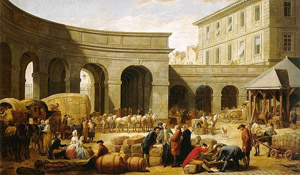 There is an impatient restlessness inside our globalized economy that is constantly tearing down and building anew. This particular aspect of the economy is like an unstoppable machine that runs over all obstacles. To resist is considered futile.
There is an impatient restlessness inside our globalized economy that is constantly tearing down and building anew. This particular aspect of the economy is like an unstoppable machine that runs over all obstacles. To resist is considered futile.
Such views are often expressed in major liberal newspapers where economic dogmas are affirmed (and discarded) almost with an air of infallibility. One such dogma is pronounced in the title of a bestselling book by The New York Times’ columnist Thomas Friedman: The World is Flat. His central thesis is that all trade barriers must be flattened, all processes maximized for efficiency, and whatever can be outsourced should be.
In Friedman’s flattened world we should celebrate each unstoppable impulse of the markets and every fiber optic cable that binds us together. It is a world of Thomas Hobbes’ “war of everyone against everyone.” Everyone competes with everyone—the assembly line workers in China, the software experts in India, engineers in Russia or Americans in general are all part of single global market. Anyone can displace another anytime and anywhere.
 Friedman gives the example of a Peruvian village that for centuries has made distinctive ceramic plates. He is ecstatic over the fact the Indians there have now outsourced the plates to China who ship it directly to the U.S. and other markets so that the Indians never have to touch another plate. These Indians may sell a lot of plates, but something human, something very personal has been taken out of their economy.
Friedman gives the example of a Peruvian village that for centuries has made distinctive ceramic plates. He is ecstatic over the fact the Indians there have now outsourced the plates to China who ship it directly to the U.S. and other markets so that the Indians never have to touch another plate. These Indians may sell a lot of plates, but something human, something very personal has been taken out of their economy.
Perhaps that is the main problem with this concept of a flattened world; it takes something of the soul out of economy. In the process of flattening barriers it destroys those cultural and social supports that protect society from coming apart. Even Friedman himself is forced to admit the disruptive challenges that threaten the “particular cultures, values, national identities, democratic traditions, and bonds of restraint that have historically provided some protection and cushioning for workers and communities.”1
All of this is sacrificed in the name of free trade and competition. However, the problem with this flat-earth vision is that the only thing that is not flat is the playing field. Free trade and competition only really work and thrive when similar standards and fairness prevail everywhere.
What Does Saint Thomas Say About Immigration?
But in a flattened world, frenzied production trumps everything. The prevailing doctrine is: If something can be produced cheaply somewhere, let it be done. As a result, many producers ignore the same standards of production that exist in the West and that make production more expensive. That is why, for example, the rivers of China have been turned into sewers and its air made toxic. That is why the substandard structures of textile factories in Bangladesh have come tumbling down with the loss of hundreds of lives. That is why so many businessmen tragically overlook basic human rights violations, political prisoner (slave) and child labor, unethical labor, manufacturing and trade practices, and regimes that persecute the Church. They have this disregard because they worship at the altar of this flat-earth doctrine. The playing field is far from level; it is downright lopsided.
Of course, not everyone subscribes to this flat-earth doctrine. In fact, a good portion of industry follows fair practices that allow modern economy to supply demand with great abundance. However, the sector that does follow this doctrine has a disproportionably great influence in the economy as a whole.
In my book, Return to Order: From Frenzied Economy to Organic Christian Society—Where We’ve Been, How We Got Here, and Where We Need to Go, I describe what I call frenetic intemperance. Frenetic intemperance is a reckless and restless spirit inside certain sectors of modern economy that leads us to throw off legitimate restraints, and gratify all desires. This moral defect creates an economy that is frenzied and out of balance. It creates a flat world.
This frenzied economy and a corresponding way of life ends up attacking economy’s natural immunity systems of family, community and Church that help defend society against intemperance and keep economy in balance.
What does Saint Thomas Aquinas say about Marriage?
That is why it is so important that we keep the economy within the framework of society in general. We should adopt a “round” approach that naturally restrains, while ensuring that markets and the economy are truly free. It also creates enormous variety and diversity inside markets and prevents mass standardization from turning consumers into the “masses.” It is this human touch that makes cultures and their corresponding economies so different, interesting and refreshing.
 A round world is much more suited to our human nature, which is constantly calling for new products that satisfy individual needs and preferences beyond mass markets. No matter how hard we might try to flatten them out, they always seem to pop right back up.
A round world is much more suited to our human nature, which is constantly calling for new products that satisfy individual needs and preferences beyond mass markets. No matter how hard we might try to flatten them out, they always seem to pop right back up.
[like url=https://www.facebook.com/ReturnToOrder.org]
Like our planet Earth, the world is not flat but round. We should celebrate its roundness.
1 Thomas L. Friedman, The World Is Flat: A Brief History of the Twenty-first Century (New York: Picador, 2005), P. 237.


